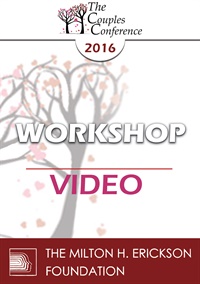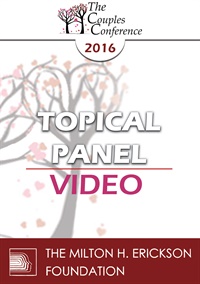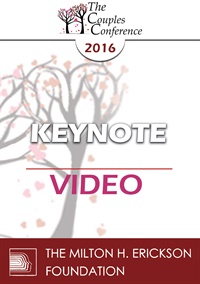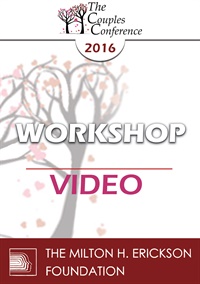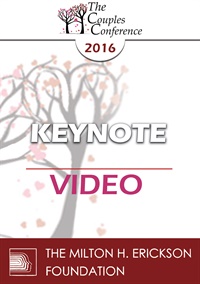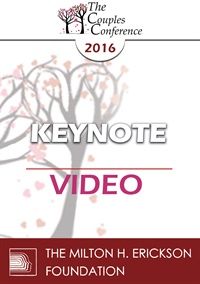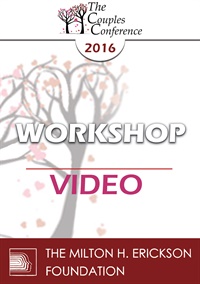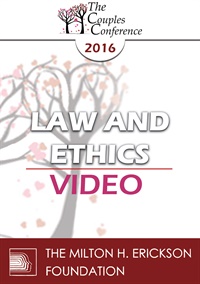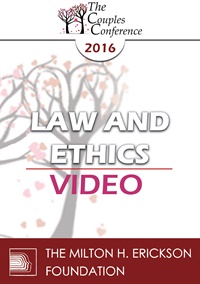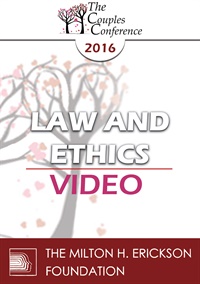- Average Rating:
- Not yet rated
- Topic Areas:
- Couples Therapy | Keynotes | Relationships
- Categories:
- Couples Conference | Couples Conference 2016
- Faculty:
- Pat Love, EdD
- Course Levels:
- Master Degree or Higher in Health-Related Field
- Duration:
- 57:11
- Format:
- Audio and Video
- Original Program Date:
- May 15, 2016
- Short Description:
- There is a deafening silence concerning mate selection in relationship therapy. Do we dare talk about what research says works–and doesn’t work? Are we afraid any insight might be used to justify leaving a good-enough relationship? While we all know relationships which defy logic, there are clear principles which can increase the probability of a more perfect union. These and other research facts will be explored.
- Price:
-
Sale is $29.00
price reduced from Base Price - $59.00
Tags: Couples Therapy Relationships
- Average Rating:
- Not yet rated
- Topic Areas:
- Workshops | Couples Therapy | Gender | Relationships | Marriage
- Categories:
- Couples Conference | Couples Conference 2016
- Faculty:
- Pat Love, EdD
- Course Levels:
- Master Degree or Higher in Health-Related Field
- Duration:
- 01:50:23
- Format:
- Audio and Video
- Original Program Date:
- May 15, 2016
- Short Description:
- Explore research findings related to mate selection as well as happiness, satisfaction and longevity in committed relationships. Case studies and clinical applications will be utilized.
- Price:
-
Sale is $29.00
price reduced from Base Price - $59.00
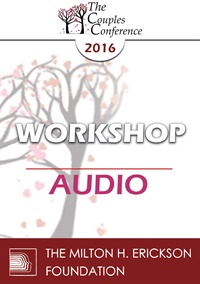
- Average Rating:
- Not yet rated
- Topic Areas:
- Workshops | Deception | Differentiation | Couples Therapy | Relationships | Behavioral Psychology | Group Therapy | Psychoanalysis
- Categories:
- Couples Conference | Couples Conference 2016 | Pioneers in Couples and Family Therapy
- Faculty:
- Ellyn Bader, PhD
- Duration:
- 02:00:14
- Format:
- Audio Only
- Original Program Date:
- May 15, 2016
- Short Description:
- Everybody lies. Some lies are loving and harmless. But, others are enormously destructive. Couples’ patterns of deception often begin innocently but end in couples destroying the love they once had. Self- deception, conflict avoidance and felony lies all undermine commitment and connection. Learn to identify and disrupt deception, confront evasiveness and hypocrisy and facilitate differentiation.
- Price:
- $15.00 - Base Price
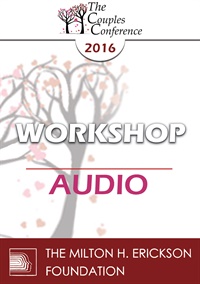
- Average Rating:
- Not yet rated
- Topic Areas:
- Couples Therapy | Attachment | Workshops | Relationships
- Categories:
- Couples Conference | Couples Conference 2016 | Pioneers in Couples and Family Therapy
- Faculty:
- Terry Real, LICSW
- Duration:
- 01:57:43
- Format:
- Audio Only
- Original Program Date:
- May 15, 2016
- Short Description:
- Attachment theory posits, along with those healthy ones, the ‘securely attached,” two important types of troubled groups – those with “anxious,” and “avoidant,” attachment styles. Said in plain English, this amounts to pursuers and distancers. But the pursuer/distancer dynamic has been a central concern to couples and family therapy since it’s inception in the nineteen-fifties. This workshop will look at some of the many ways this dynamic has been thought of and treated – from recursive feedback loops, to “love addiction/love avoidance,” to attachment styles and beyond.
- Price:
- $15.00 - Base Price
- Average Rating:
- Not yet rated
- Topic Areas:
- Attachment | Topical Panels | Couples Therapy
- Categories:
- Couples Conference | Couples Conference 2016
- Faculty:
- Diane Poole Heller, PhD | Rick Miller, MSW | Scott R. Woolley, PhD
- Course Levels:
- Master Degree or Higher in Health-Related Field
- Duration:
- 53:55
- Format:
- Audio and Video
- Original Program Date:
- May 15, 2016
- Short Description:
- CC16 Topical Panel 03 - Attachment - Rick Miller, LICSW, Diane Heller, Scott Woolley, PhD Panel on Attachment
- Price:
-
Sale is $29.00
price reduced from Base Price - $59.00
Tags: Attachment Couples Therapy
Credit available - Click Here for more information
- Average Rating:
- Not yet rated
- Topic Areas:
- Attachment | Emotionally Focused Therapy (EFT) | Workshops | Affairs | Couples Therapy | Relationships
- Categories:
- Couples Conference | Couples Conference 2016
- Faculty:
- Scott R. Woolley, PhD
- Course Levels:
- Master Degree or Higher in Health-Related Field
- Duration:
- 01:09:00
- Format:
- Audio and Video
- Original Program Date:
- May 15, 2016
- Short Description:
- Affairs can have a devastating impact on couple relationships. Emotionally Focused Therapy provides a powerful way to intervene when there has been an affair. This workshop provides a typology of different types of affairs and treatment strategies for each type. Using video and case demonstration, participants will learn how to identify, manage, and bring healing and safety to couple relationships when there has been an affair.
- Price:
-
Sale is $29.00
price reduced from Base Price - $59.00
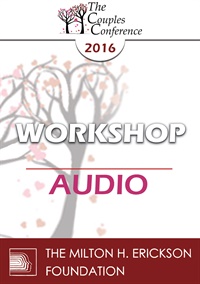
- Average Rating:
- Not yet rated
- Topic Areas:
- Attachment | Workshops | LGBTQ | Relationships | Differentiation | Communication | Intimacy | Sex and Sexuality
- Categories:
- Couples Conference | Couples Conference 2016
- Faculty:
- Rick Miller, MSW
- Duration:
- 01:44:31
- Format:
- Audio Only
- Original Program Date:
- May 15, 2016
- Short Description:
- Gay men face unique challenges regarding intimacy, communication and personal autonomy. Hiding due to being gay along with being raised male, creates a dynamic of distancing as the norm. The goal of psychotherapy is to accept and verbalize vulnerabilities in a context of safety, encourage revealing oneself for the sake of self-acceptance, and to learn how to receive nurturance from others. This workshop will define the art of how to gain connection while maintaining autonomy. There will also be an emphasis on sexuality and how specific attachment styles effects choices related to safety, security and risky sexual practices.
- Price:
- $15.00 - Base Price
- Average Rating:
- Not yet rated
- Topic Areas:
- Topical Panels | Differentiation | Couples Therapy | Attachment | Developmental Therapy Model | Multicultural | Therapeutic Model | Emotional Regulation
- Categories:
- Couples Conference | Couples Conference 2016 | Pioneers in Couples and Family Therapy
- Faculty:
- Ellyn Bader, PhD | Esther Perel, MA, LMFT | Terry Real, LICSW
- Course Levels:
- Master Degree or Higher in Health-Related Field
- Duration:
- 01:07:58
- Format:
- Audio and Video
- Original Program Date:
- May 14, 2016
- Short Description:
- A dynamic panel of experts delves into differentiation in couples therapy, revealing how partners can maintain individual identity while staying connected. The panelists discuss strategies for communication, boundaries, and personal growth, addressing challenges from cultural differences to addiction. Drawing on personal experiences and professional insights, they offer techniques to help couples embrace vulnerability, curiosity, and passionate relationships.
- Price:
-
Sale is $29.00
price reduced from Base Price - $59.00
- Average Rating:
- Not yet rated
- Topic Areas:
- Keynotes | Couples Therapy | Relationships | Attachment | Differentiation
- Categories:
- Couples Conference | Couples Conference 2016 | Pioneers in Couples and Family Therapy
- Faculty:
- Terry Real, LICSW
- Course Levels:
- Master Degree or Higher in Health-Related Field
- Duration:
- 34:00
- Format:
- Audio and Video
- Original Program Date:
- May 14, 2016
- Short Description:
- All couples and couples therapies struggle with issues of mixed loyalties. At any given moment, do I choose my own fulfillment as an individual or do I yield to the needs of the relationship? Is it a zero-sum game in which one partner wins and one loses – and if not, how else can we think about it? This keynote address introduces a model integrating both attachment and differentiation in couples therapy through the idea of enlightened self-interest – taking care of yourself by taking care of the relationship – as well as a model of healthy sacrifice, which is missing in our contemporary, Narcissistic culture.
- Price:
-
Sale is $29.00
price reduced from Base Price - $59.00
- Average Rating:
- Not yet rated
- Topic Areas:
- Trauma | Workshops | Intimacy | Relationships | Couples Therapy
- Categories:
- Couples Conference | Couples Conference 2016 | Pioneers in Couples and Family Therapy
- Faculty:
- Terry Real, LICSW
- Course Levels:
- Master Degree or Higher in Health-Related Field
- Duration:
- 02:05:42
- Format:
- Audio and Video
- Original Program Date:
- May 14, 2016
- Short Description:
- Research confirms our clinical experience. We can teach partners all manner of skills but in moments of triggering, emotional flooding, skills go out the window. Why? Because we are no longer in our adult selves. Our thinking brain has shut down and the limbic system has taken over. An inner child part has seized the wheel. This workshop introduces a model of working with the traumatized parts of the partners we treat by empowering individuals to come into conscious relationship with those parts—loving, understanding, and ultimately containing them.
- Price:
-
Sale is $29.00
price reduced from Base Price - $59.00
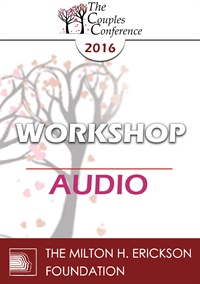
- Average Rating:
- Not yet rated
- Topic Areas:
- Addiction | Workshops | Couples Therapy | Developmental Therapy Model | Cognitive Psychology | Family Therapy | Neuroscience | Psychoanalysis | Therapist Techniques | Brain Chemistry
- Categories:
- Couples Conference | Couples Conference 2016 | Pioneers in Couples and Family Therapy
- Faculty:
- Ellyn Bader, PhD | Sue Diamond, MA, RCC
- Duration:
- 01:55:02
- Format:
- Audio Only
- Original Program Date:
- May 14, 2016
- Short Description:
- Two particularly challenging issues that surface in couples therapy are addiction and self absorption. Through the lens of the Developmental Model of Couples Therapy, Sue and Ellyn will describe how to make strategic treatment decisions that propel couples toward sobriety and more collaborative functioning. They will review the troublesome traits of the self-absorbed partner and illuminate ways to increase other-differentiation and increase caring and compassion.
- Price:
- $15.00 - Base Price
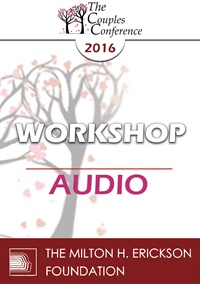
- Average Rating:
- Not yet rated
- Topic Areas:
- Emotionally Focused Therapy (EFT) | Workshops | Affairs | Couples Therapy | Sex and Sexuality
- Categories:
- Couples Conference | Couples Conference 2016
- Faculty:
- Scott R. Woolley, PhD
- Duration:
- 01:16:00
- Format:
- Audio Only
- Original Program Date:
- May 14, 2016
- Short Description:
- Engaging withdrawn men in therapy is often challenging, particularly when the man is engaged in compulsive sexual behaviors such as affairs and pornography. Therapists will learn to how to engage withdrawers both with their own internal experience and disowned aspects of the self and with their partner. Therapy video will be used to demonstrate the process.
- Price:
- $15.00 - Base Price
- Average Rating:
- Not yet rated
- Topic Areas:
- Neuroscience | Addiction | Keynotes | Love | Couples Therapy
- Categories:
- Couples Conference | Couples Conference 2016
- Faculty:
- Helen E. Fisher, PhD
- Course Levels:
- Master Degree or Higher in Health-Related Field
- Duration:
- 01:55:21
- Format:
- Audio and Video
- Original Program Date:
- May 13, 2016
- Short Description:
- Biological anthropologist Helen Fisher discusses three brain systems that evolved for mating and reproduction: the sex drive; feelings of intense romantic love; and feelings of deep attachment to a long term partner. She then focuses on her brain scanning research (using fMRI) on romantic rejection and the trajectory of love addiction following rejection. She concludes with discussion of the brain circuits associated with long-term partnership happiness and the future of relationships in the digital age—what she calls “slow love.”
- Price:
-
Sale is $29.00
price reduced from Base Price - $59.00
- Average Rating:
- Not yet rated
- Topic Areas:
- Neuroscience | Topical Panels | Couples Therapy
- Categories:
- Couples Conference | Couples Conference 2016 | Pioneers in Couples and Family Therapy
- Faculty:
- Stan Tatkin, PsyD, MFT | Pat Love, EdD | Helen E. Fisher, PhD
- Course Levels:
- Master Degree or Higher in Health-Related Field
- Duration:
- 01:01:00
- Format:
- Audio and Video
- Original Program Date:
- May 13, 2016
- Short Description:
- CC16 Topical Panel 01 - Neuroscience - Helen Fisher, PhD, Pat Love, EdD, and Stan Tatkin, PsyD Panel discussion on neuroscience.
- Price:
-
Sale is $29.00
price reduced from Base Price - $59.00
Tags: Neuroscience Couples Therapy
- Average Rating:
- Not yet rated
- Topic Areas:
- Couples Therapy | Keynotes | Psychobiological Approach to Couples Therapy (PACT) | Neurobiology | Relationships
- Categories:
- Couples Conference | Couples Conference 2016 | Pioneers in Couples and Family Therapy
- Faculty:
- Stan Tatkin, PsyD, MFT
- Course Levels:
- Master Degree or Higher in Health-Related Field
- Duration:
- 51:04
- Format:
- Audio and Video
- Original Program Date:
- May 13, 2016
- Short Description:
- This one-hour presentation will demonstrate cross-dialogic and other strategic techniques for shepherding couples toward secure functioning, an attitudinal and behavioral expectation that couples operate as a two-person psychological system. Because the concept of secure-functioning is principle based and not personality based, the success of secure-functioning relationships does not depend upon attachment orientation. The presentation will endeavor to help the clinician utilize psychobiological strategies to help clarify partner attachment strategies, true desires, and unspoken agendas in couple therapy.
- Price:
-
Sale is $29.00
price reduced from Base Price - $59.00
- Average Rating:
- Not yet rated
- Topic Areas:
- Couples Therapy | Workshops | Deception | Attachment | Relationships
- Categories:
- Couples Conference | Couples Conference 2016 | Pioneers in Couples and Family Therapy
- Faculty:
- Stan Tatkin, PsyD, MFT
- Course Levels:
- Master Degree or Higher in Health-Related Field
- Duration:
- 02:10:07
- Format:
- Audio and Video
- Original Program Date:
- May 13, 2016
- Short Description:
- The psychobiologically oriented couple therapist understands that the intersubjective, phenomenological process operating in primary attachment relationships relies heavily on fast acting implicit memory systems. Because of this phenomenon partners in a relationship rarely know what they are doing or why, and so they confabulate meaning in the absence of real understanding. Additionally, partners in couple therapy maintain hidden agendas and use deception in order to protect themselves from loss.
- Price:
-
Sale is $29.00
price reduced from Base Price - $59.00
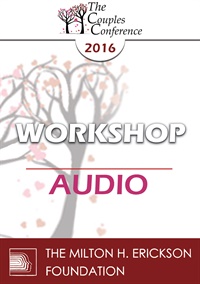
- Average Rating:
- Not yet rated
- Topic Areas:
- Workshops | Couples Therapy
- Categories:
- Couples Conference | Couples Conference 2016
- Faculty:
- Pat Love, EdD
- Duration:
- 54:37
- Format:
- Audio Only
- Original Program Date:
- May 13, 2016
- Short Description:
- Heuristic (hyoo' ristik) Enabling a person to discover or learn something for themselves. A "hands on" approach to learning. What would it look like if the primary goal of therapy were to enable clients to discover, experience for themselves the goals they set in therapy. A simple model for heuristic helping will be presented.
- Price:
- $15.00 - Base Price
Tags: Couples Therapy
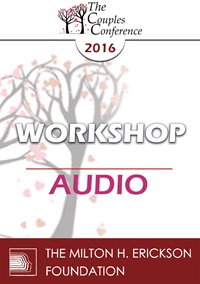
- Average Rating:
- Not yet rated
- Topic Areas:
- Neuroscience | Attachment | Workshops | Experiential Therapy | Mindfulness | Couples Therapy
- Categories:
- Couples Conference | Couples Conference 2016
- Faculty:
- Rob Fisher, MFT
- Duration:
- 01:54:14
- Format:
- Audio Only
- Original Program Date:
- May 13, 2016
- Short Description:
- Now that you understand the neuropsychology of attachment, how are you going to use it in a session where one partner is yelling at the other for abandoning him/her who is in turn trying to take refuge under the coach? Learn how to put theory into practice using an experiential approach to explore old neural circuitry around attachment and build new pathways. We will be using the present moment and mindfulness integrated into therapy to slow things down and rewire the brain.
- Price:
- $15.00 - Base Price
- Average Rating:
- Not yet rated
- Topic Areas:
- Keynotes | Couples Therapy | Neurobiology
- Categories:
- Couples Conference | Couples Conference 2016
- Faculty:
- Daniel Siegel, MD
- Course Levels:
- Master Degree or Higher in Health-Related Field
- Duration:
- 1:03:24
- Format:
- Audio and Video
- Original Program Date:
- May 13, 2016
- Short Description:
- The interdisciplinary field of Interpersonal Neurobiology combines all disciplines of science and other fields into one framework and offers a definition of the mind and of mental health that are of practical benefit to those seeking to enhance resilience and well-being. This perspective proposes that one aspect of the mind is an "emergent, self-organizing, embodied and relational process that regulates the flow of energy and information." From this view, a healthy mind and health itself emerge from a process called integration–the linkage of differentiated parts.
- Price:
-
Sale is $29.00
price reduced from Base Price - $59.00
Tags: Couples Therapy Neurobiology
- Average Rating:
- Not yet rated
- Topic Areas:
- Law & Ethics | Therapist Development
- Categories:
- Couples Conference | Couples Conference 2016
- Faculty:
- A. Steven Frankel, PhD, JD, ABPP
- Course Levels:
- Master Degree or Higher in Health-Related Field
- Duration:
- 02:05:42
- Format:
- Audio and Video
- Original Program Date:
- May 12, 2016
- Short Description:
- “What goes around….” and it’s focused on recent and emerging developments in law and ethics that will impact clinicians of all disciplines, starting with changes to child abuse reporting obligations, then moving to cover changes for custody evaluators, record-keeping and maintenance, emerging issues and risks regarding telehealth practice...
- Price:
-
Sale is $29.00
price reduced from Base Price - $59.00
Tags: Ethics Law Therapist Development
- Average Rating:
- Not yet rated
- Topic Areas:
- Law & Ethics | Therapist Development
- Categories:
- Couples Conference | Couples Conference 2016
- Faculty:
- A. Steven Frankel, PhD, JD, ABPP
- Course Levels:
- Master Degree or Higher in Health-Related Field
- Duration:
- 01:51:56
- Format:
- Audio and Video
- Original Program Date:
- May 12, 2016
- Short Description:
- “What goes around….” and it’s focused on recent and emerging developments in law and ethics that will impact clinicians of all disciplines, starting with changes to child abuse reporting obligations, then moving to cover changes for custody evaluators, record-keeping and maintenance, emerging issues and risks regarding telehealth practice...
- Price:
-
Sale is $29.00
price reduced from Base Price - $59.00
Tags: Ethics Law Therapist Development
- Average Rating:
- Not yet rated
- Topic Areas:
- Law & Ethics | Therapist Development
- Categories:
- Couples Conference | Couples Conference 2016
- Faculty:
- A. Steven Frankel, PhD, JD, ABPP
- Course Levels:
- Master Degree or Higher in Health-Related Field
- Duration:
- 01:27:40
- Format:
- Audio and Video
- Original Program Date:
- May 12, 2016
- Short Description:
- “What goes around….” and it’s focused on recent and emerging developments in law and ethics that will impact clinicians of all disciplines, starting with changes to child abuse reporting obligations, then moving to cover changes for custody evaluators, record-keeping and maintenance, emerging issues and risks regarding telehealth practice...
- Price:
-
Sale is $29.00
price reduced from Base Price - $59.00
Tags: Ethics Law Therapist Development





